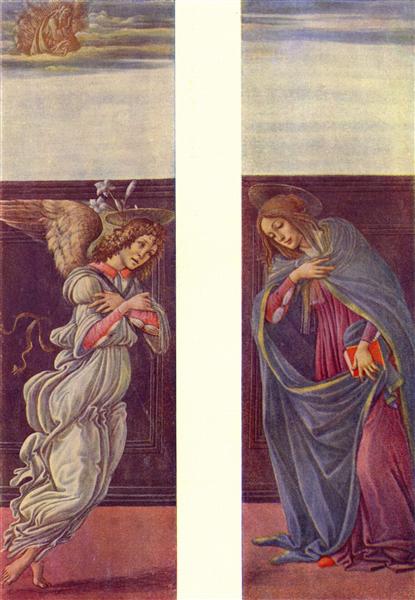Description
Sandro Botticelli's painting "The Annunciation", painted in 1500, stands as a magnificent example of the Italian Renaissance, where technical mastery is intertwined with spiritual depth. This work, which represents the moment when the Archangel Gabriel announces to the Virgin Mary that she will give birth to the Son of God, is rich in symbolism and aesthetic proposal, rescuing elements of medieval art while projecting a new Renaissance sensibility.
The composition of the work is notable for its balance and proportion, qualities that characterize Botticelli's style. The scene is arranged in a way that captures the interactions between the two main characters. Gabriel, portrayed with ethereal elegance, is presented in a contemplative movement, his arm extended in a gesture that suggests both the action of announcing and the invitation to acceptance. The Virgin, meanwhile, stands at the center of the composition, in a state of wonder, adding to the narrative tension of the scene. Her posture reflects a mix of acceptance and surprise, capturing the emotional complexity of this pivotal moment.
The use of colour is equally significant. Botticelli resorts to a soft, light palette, with blue and gold hues predominating, evoking an atmosphere of serenity and transcendence. The deep blue of Mary's cloak contrasts with the warm tones of the surrounding space, creating a sense of depth and three-dimensionality. This use of colour not only provides a visual separation between Gabriel and Mary, but also highlights the spiritual significance of the encounter, in which blue is often associated with the divine and the heavenly.
The details in the iconography of the work are fascinating: the lily in Gabriel's hand is a symbol of purity, while the angels in the background seem to observe the encounter from a reverent distance, reinforcing the sacred character of the scene. The architecture of the background, with its well-defined architectural lines, suggests a tangible space that complements the celestial plane in which the encounter takes place, a duality that is characteristic of Botticelli's work.
It is important to note that Botticelli's "The Annunciation" was not an isolated case, but shares a broader context in which other artists also explored the Annunciation. Contemporary or earlier paintings, such as the works of Fra Angelico or Michelangelo, also address this theme with their own visual vocabulary. However, Botticelli's interpretation stands out for its subtlety and the way it incorporates a sense of introspection into his characters, a distinctive trait that can be traced throughout his career.
In conclusion, Sandro Botticelli's The Annunciation stands as an essential work within the Renaissance canon, where technical knowledge and spiritual exploration flow into a moving representation. Through his singular composition, his evocative palette, and the emotional depth of his characters, Botticelli manages to capture not only a divine moment, but also the essence of the human experience when confronted with the transcendent. This work, far from being a simple account of a religious scene, becomes a dialogue of light, color, and form, inviting the viewer to contemplate not only the event depicted, but also his own relationship with the sacred.
KUADROS ©, a famous painting on your wall.
Hand-made oil painting reproductions, with the quality of professional artists and the distinctive seal of KUADROS ©.
Painting reproduction service with satisfaction guarantee. If you are not completely satisfied with the replica of your painting, we will refund 100% of your money.

